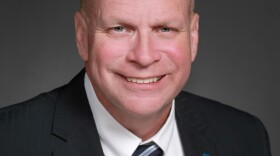A state lawmaker revived an anti-trans bill on Thursday, the last day to get measures out of committees.
Rep. Toni Hasenbeck (R-Elgin) changed Senate Bill 2, a school finance measure, to require school and intercollegiate athletics teams in the state be based on biological sex, banning transgender athletes from competing on women’s teams. The amendment brought back language in Senate Bill 331, which didn't get a hearing in the Senate.
Hasenbeck said the "Save Women’s Sports Act" is about protecting female athletes.
"And it also clarifies and solidifies Title IX, which was created in 1972, which honored the biological difference between males and females," Hasenbeck said.
ACLU of Oklahoma Director of Policy and Advocacyu Nicole McAfee said Hasenbeck used a common misrepresentation of the federal civil rights law prohibiting discrimination on the basis of sex.
"Bills like these discriminate against transgender individuals … on the basis of sex. It is a very clear violation, and all of the talking points that suggest otherwise are really just — I think really misleading, sort of propaganda," McAfee said.
SB2 goes beyond the Oklahoma Secondary Schools Activities Association policy and the NCAA policy on transgender athletes. Both allow transgender women and girls to compete after completing a year of hormone therapy.
The NCAA’s policy also says assumptions transgender women have a competitive advantage are "not well founded" and fears men will pretend to be women to compete on women’s teams are "unwarranted."
Rep. Mauree Turner asked Hasenbeck during Thursday's House Criminal Justice and Corrections Committee hearing why she’s running the anti-trans bill and in the process, was misgendered by Chair Justin Humphrey (R-Lane), something Turner has corrected several times this session. After Turner, who is non-binary, thanked Humphrey for allowing a follow-up question, Humphrey called them "ma'am."
"Not ma’am. Is it your understanding that just because something isn’t derived out of hate does not mean that it is not hateful?" Turner asked Hasenbeck.
"No one has the power to put hatred in my heart. I think someone choosing to look at this as a hateful act, that process of thoughts belongs to that person," Hasenbeck said.
The bill passed committee 4–1, with Turner the lone vote against. ACLU of Oklahoma and LGBTQ advocacy group Freedom Oklahoma issued a statement urging lawmakers not to continue considering SB2.
"Robbing children of opportunities to feel wanted, included, and part of a team is a particular cruelty that only the most extreme legislators would support. Sports are an important way for children to learn invaluable lessons like leadership, confidence, self-discipline, and teamwork. Taking this opportunity from transgender children will do nothing to protect other children and do so much to harm kids who just want to be treated with fairness and respect," said Freedom Oklahoma Executive Director Allie Shinn.
McAfee said there's a lot of potential fallout if SB2 becomes law.
"Passing this legislation immediately means Oklahoma potentially loses things like the softball championships and that we become embattled in litigation while also seeing the real harm on the ground to trans youth who see a government that is actively rejecting and trying to erase them," McAfee said.
This year’s Women's College World Series is in Oklahoma City. In 2016, the NCAA pulled seven championships from North Carolina after lawmakers there passed a bill requiring transgender people use restrooms corresponding to the sex on their birth certificates. That bill also blocked local LGBTQ anti-discrimination policies.






